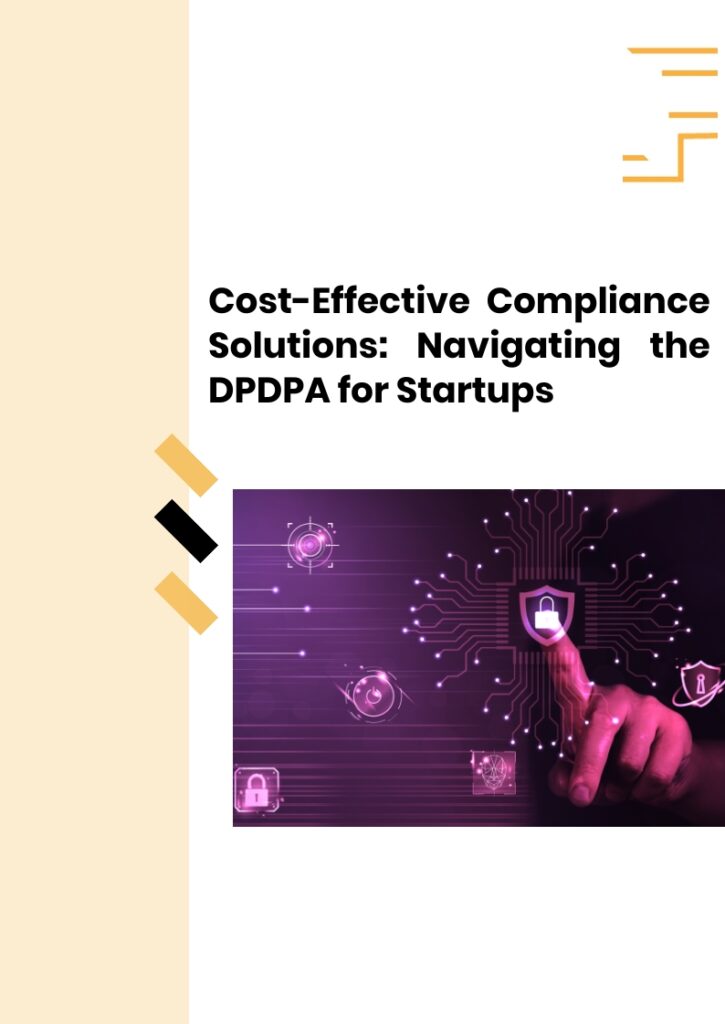
Cost-Effective Compliance Solutions: Navigating the DPDPA for Startups
The Digital Personal Data Protection Act (DPDPA) is a pivotal regulation designed to enhance the protection of personal data. For startups, ensuring compliance with the DPDPA is not just a legal obligation but a necessity to build trust and protect their business reputation. However, the Act does not specify the extent of resources required for implementing data protection measures, leaving many startups uncertain about how to comply cost-effectively. This article explores affordable ways to implement data protection measures, the availability of government-approved compliance solutions, and strategies for demonstrating a proportionate approach to compliance based on a startup’s size and resources.
Affordable Data Protection Measures
Compliance with the DPDPA does not have to break the bank. Startups can adopt several cost-effective strategies to meet the requirements of the Act while maintaining a lean budget.
1. Open Source Tools
Open source tools provide robust and free solutions for many data protection needs. Here are some categories and examples of such tools:
- Encryption: Tools like VeraCrypt and GnuPG offer strong encryption for data at rest and in transit.
- Firewalls: pfSense is a free firewall solution that can help secure your network against unauthorized access.
- Data Masking: DataMasker offers open-source data masking to protect sensitive information during development and testing.
- Endpoint Protection: ClamAV provides free antivirus protection for different platforms.
2. Cloud-Based Security Services
Many cloud service providers, like Amazon Web Services (AWS), Google Cloud Platform (GCP), and Microsoft Azure, offer security features included in their service packages at no additional cost. These features include:
- Encryption: Built-in encryption for data at rest and in transit.
- Access Controls: Identity and access management (IAM) services to control user access.
- Compliance Certifications: Providers often have compliance certifications (e.g., ISO 27001, GDPR) that startups can leverage.
3. Managed Security Services
Outsourcing security to managed service providers (MSPs) can be more cost-effective than building an in-house security team. MSPs offer services like:
- 24/7 Monitoring: Continuous monitoring of systems for security incidents.
- Incident Response: Expert assistance in case of data breaches or security incidents.
- Vulnerability Management: Regular scans and updates to mitigate vulnerabilities.
4. Security Training and Awareness Programs
Human error is a significant risk factor in data protection. Training employees on data protection best practices can be a cost-effective way to enhance security. Many organizations offer free or low-cost training resources, such as:
- Online Courses: Platforms like Coursera and Udemy offer affordable courses on data security.
- Webinars and Workshops: Free webinars from industry experts and government bodies can provide valuable insights.
Government-Approved Compliance Solutions
While the DPDPA does not mandate specific solutions, government-approved or recommended solutions can provide a benchmark for startups. These solutions ensure that startups meet the required standards without overextending their budgets.
1. Government Frameworks and Certifications
Government frameworks and certifications can help guide startups toward compliance. Some key frameworks include:
- ISO/IEC 27001: This international standard for information security management can be a useful guideline for startups. Certification ensures that a startup’s information security management system (ISMS) meets best practices.
- NIST Cybersecurity Framework: Developed by the U.S. National Institute of Standards and Technology, this framework provides guidelines for improving cybersecurity infrastructure.
2. Local Government Programs
Many governments offer programs and resources to help small businesses and startups comply with data protection regulations. Examples include:
- Grants and Subsidies: Some governments provide financial assistance for startups to implement data protection measures.
- Consultation Services: Free or subsidized consultation services to help startups understand and comply with data protection regulations.
3. Public Sector Solutions
In some regions, public sector organizations offer tools and services to help businesses comply with data protection laws. These might include:
- Data Protection Authorities: Guidance and resources from data protection authorities can help startups navigate compliance.
- Government-Approved Vendors: Lists of approved vendors who provide compliant solutions can be a reliable resource.
Demonstrating Proportionate Compliance
For startups, demonstrating compliance in a manner proportionate to their size and resources is crucial. The DPDPA recognizes that smaller organizations may have different capabilities compared to larger enterprises. Here’s how startups can show proportionate compliance:
1. Risk Assessment
Conducting a thorough risk assessment helps startups identify their most critical data protection needs and allocate resources effectively. A risk assessment involves:
- Identifying Data Assets: Cataloging all personal data held and processed.
- Assessing Risks: Evaluating potential threats to data and their impact.
- Prioritizing Mitigations: Focusing on high-risk areas first.
2. Scalable Solutions
Startups should implement scalable solutions that can grow with their business. This approach ensures that compliance measures remain cost-effective and sustainable. Scalable solutions include:
- Modular Security Tools: Tools that allow adding or upgrading features as needed.
- Cloud Services: Cloud platforms that provide scalable security features based on usage.
3. Documentation and Policies
Maintaining comprehensive documentation and clear policies demonstrates a commitment to compliance. Key documents include:
- Privacy Policy: Clearly outlines how personal data is collected, used, and protected.
- Data Protection Impact Assessments (DPIAs): Assessments that show how data protection risks are managed.
- Incident Response Plan: A documented plan for responding to data breaches and security incidents.
4. Regular Audits and Reviews
Regularly auditing and reviewing data protection practices helps ensure ongoing compliance and improvement. Audits should cover:
- Compliance Checks: Ensuring all practices align with the DPDPA requirements.
- Vulnerability Assessments: Identifying and addressing security weaknesses.
- User Feedback: Incorporating user feedback to improve data protection measures.
Case Studies and Practical Examples
To illustrate these strategies in action, consider the following examples of startups successfully navigating cost-effective compliance:
Case Study 1: Startup A – Leveraging Open Source Tools
Overview: A tech startup focused on app development needed to comply with the DPDPA but had a limited budget.
Solution:
- Encryption: Implemented VeraCrypt for data encryption.
- Firewall: Used pfSense to secure their network.
- Training: Provided employees with free online courses on data protection.
Outcome: Achieved compliance with minimal costs, enhancing data security and user trust.
Case Study 2: Startup B – Utilizing Cloud-Based Services
Overview: An e-commerce startup required scalable security solutions as they expanded rapidly.
Solution:
- AWS Security Features: Leveraged built-in AWS security features for encryption and access controls.
- Managed Services: Outsourced security monitoring to an MSP.
Outcome: Ensured robust security while keeping costs manageable and focusing resources on growth.
Case Study 3: Startup C – Government-Approved Compliance
Overview: A healthcare startup needed to meet stringent data protection requirements.
Solution:
- ISO/IEC 27001 Certification: Achieved certification to demonstrate compliance.
- Government Grants: Utilized a government subsidy program to fund security improvements.
- Consultation Services: Took advantage of free government consultation services for compliance guidance.
Outcome: Met all regulatory requirements, securing sensitive health data and gaining a competitive edge.
Tips for Startups to Enhance Data Protection Affordably
1. Prioritize Data Protection Needs
Focus on the most critical areas first, such as encryption, access control, and incident response. This prioritization ensures that essential protections are in place while working within budget constraints.
2. Leverage Existing Resources
Utilize existing tools and services that offer built-in security features, such as those provided by cloud service providers. This approach can reduce the need for additional investments.
3. Foster a Security Culture
Promote a culture of security awareness among employees. Regular training and clear policies can help prevent human errors that could lead to data breaches.
4. Collaborate and Share Knowledge
Engage with industry groups, forums, and networks to share knowledge and resources on compliance solutions. Collaboration can lead to discovering cost-effective practices and tools.
5. Negotiate with Vendors
When working with vendors, negotiate terms that include security features as part of the service package. This negotiation can help reduce additional costs associated with compliance.
Conclusion
The DPDPA mandates rigorous data protection measures, but compliance need not be prohibitively expensive. By leveraging open source tools, cloud-based services, managed security services, and government-approved solutions, startups can implement effective data protection measures within their budget constraints. Additionally, adopting a proportionate approach to compliance, conducting regular audits, and fostering a culture of security can further enhance their data protection practices.
Startups must focus on prioritizing their data protection needs, utilizing scalable and cost-effective solutions, and maintaining clear documentation and policies. By doing so, they can not only comply with the DPDPA but also build trust with their users, protect their reputation, and position themselves for long-term success in an increasingly data-conscious world.





